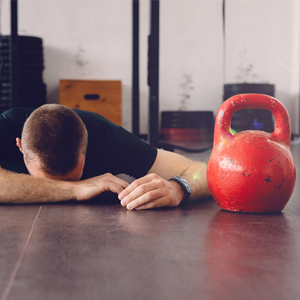
How often do you exercise a week? How long do you work out? What kind of intensity do you aim for?
For years, we’ve been told that we need to move more and sit less. However, sometimes, pushing yourself too hard can cause more harm than good – resulting in much more than aching muscles.
Here are two ways exercise can kill you.
1. Rhabdomyolysis
Also called rhabdo, this is one of the most dangerous conditions you can suffer from when exercising. According to Men’s Fitness, it most often affects weightlifters and marathon runners who push themselves past the point of exhaustion, while becoming dehydrated.
When you reach rhabdo, your damaged skeletal muscle tissue breaks down quickly. The breakdown products (mainly a protein called myoglobin) are released into your bloodstream and may cause severe harm to your kidneys, causing them to shut down.
The likelihood of rhabdo occurring increases when you perform repetitive movements. “It can happen with any intense exercise if it involves repetitive motion of a muscle and new movement,” said Maureen Brogan, an associate professor of medicine at New York Medical College in The American Journal of Medicine.
Runner and female winner of the 2017 Comrades Marathon Camille Herron suffered from rhadbo earlier this year. Fortunately it was contained in time.
Symptoms: Intense muscle pain, weakness, dark-coloured urine
How it can kill you: Your kidneys work hard at removing excess water and waste from your blood. If they fail, blood levels of urea can increase. Urea is toxic and can have a detrimental effect on all major organs.
Treatment: Prevention is better than cure so don’t push yourself too hard, especially when you’re first starting out. Initial treatment for rhabdo, according to an article in the Ochsner Journal, focuses on the management of the ABCs (airway, breathing, circulation) and preserving renal function through rehydration. Although renal failure can cause death, it can be treated – recovery often depends on the underlying cause and treatment.
2. Dehydration
Your body needs fluid to survive – and during exercise, you need to take in more, particularly if it’s hot and humid and you’re sweating profusely. Severe dehydration occurs when you lose 7% (or more) of your body’s fluid.
You lose about 1.2 to 1.5 litres of fluid every day through urination, while perspiration can cause you lose about 1 litre of fluid. This is why you need about 2.5 litres of fluid per day to avoid dehydration.
Scottish marathon runner Callum Hawkins collapsed just two kilometres from the end of the marathon at the 2018 Commonwealth Games in Australia.
Dr Brian McKay told news.com.au that dehydration and heat exhaustion would have made him ketotic (when the body is using fat instead of glucose for energy), which explains his delirious state of mind. "Normally sugar is going around your body providing the energy you need for your brain and your muscles, but if you’re getting to absolute exhaustion the sugar is gone and your ‘back-up system kicks in’."
Symptoms: Extreme thirst, changes in mood, decreased urination, poor skin elasticity, fever, decreased blood pressure, loss of consciousness, organ failure
How it can kill you: Once you start to lose 7% of your body weight, your body struggles to maintain blood pressure. As this happens, blood flow to non-vital organs, including your kidneys and gut, begins to slow. When your kidneys stop filtering blood, cellular waste builds up. If you don't rehydrate, you will die from kidney failure.
Treatment: Avoid dehydration with fluids or foods like watermelon, cucumber, oranges or pineapples.
You can rehydrate with a solution make up of half a teaspoon of salt and eight teaspoons of sugar in a litre of water. You can also use rehydration salts. If a person is unconscious or unable to drink, fluids can be given intravenously.
Worried you’re over exercising?
Exercise is important for our health but like everything in life, even exercise needs to be done in moderation. If you are following a rigorous training programme, keep an eye out for any of these symptoms that might indicate you are overtraining and need a few days' rest.
- Fatigue
- Poor sleep even though you are tired
- Sore muscles
- Your workout performance is suffering
- You're unable to complete workouts
- Irritability
- Loss of appetite
- Loss of libido
- Poor co-ordination
- Swollen lymph glands
- Abnormal heart rate
Image credit: iStock




 Publications
Publications
 Partners
Partners














